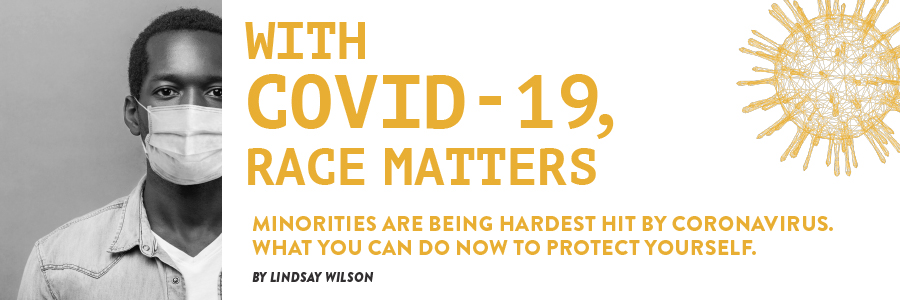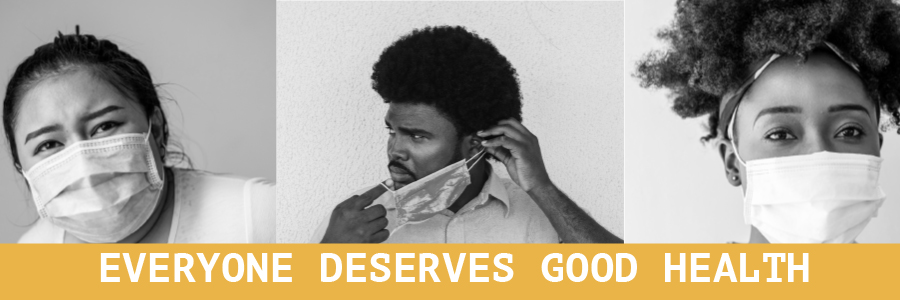


Sign-up for {N}power to get exclusive discounts, newsletters, members-only features, and more!

Coronavirus has impacted families across America, but minorities are among those that have been hardest hit. In New York City, COVID-19 has been twice as deadly for African Americans and Latinos compared to white people.1 Native Americans have also been disproportionately impacted: In New Mexico, Native Americans account for more than 41 percent of COVID infections but make up less than 11 percent of the state’s population, and infection rates among Native Americans on the Navajo reservation are among the highest in the world.2 3
The reasons for these racial disparities are varied and deeply complex. Structural racism, unequal access to affordable healthy foods, targeted junk food marketing, unequal access to quality healthcare, more workers in essential jobs who cannot stay home, and living in areas with more pollution are just some of them. Here, we will examine some of the key health-related factors that make minorities more vulnerable to COVID-19.

Chronic health conditions like hypertension, obesity, and type-2 diabetes are generally diet-driven conditions, and can be improved with positive dietary changes. But for many minorities, chronic illness is rooted in a lack of access to healthy food.
Food insecurity, the lack of access to affordable, nutritious food, is related to multiple chronic diseases like those mentioned above. A recent analysis investigating trends in food insecurity from 2001 to 2016 found that African American and Latino households were at least twice as likely than white households to experience food insecurity. A separate study by Johns Hopkins University found that food insecurity rates in Navajo Nation were the highest reported of any population in the United States, with 76.7 percent experiencing some level of food insecurity.4 5
Folks who are food insecure are more likely to rely on federal food assistance programs like the Supplemental Nutrition Assistance Program (SNAP), a program built within a food system in which the government subsidizes commodity crops like corn and soy that are made into highly processed foods that are very cheap, and very low in nutrition. Research has found that while overall diet quality improved among U.S. adults between 1999 and 2014, SNAP participants saw a worsening in diet quality.xiv xv To compound the problem, junk food advertising is disproportionately targeted to African Americans and Latinos (particularly children and teens), especially when it comes to fast food, candy, sugary drinks, and unhealthy snacks—the very foods that contribute to diet-related health conditions like diabetes, heart disease, and obesity.6 7 8 9 10
Junk food is devoid of vital nutrients like zinc, vitamin C, phytonutrients, and antioxidants. A junk-food based diet will eventually lead to nutritional deficiencies, and will ultimately drive the development of chronic diseases. Additionally, the body quickly burns through certain nutrients, like the B vitamins, to metabolize sugary junk foods, further increasing the likelihood of developing nutrient deficiencies.
By relentlessly promoting unhealthy foods to minorities, these companies are heavily influencing the way whole groups of people eat, and directly driving diet-related disease. Finally, a long history of residential racial segregation plays an important role in the development of poor health: “…black people have experienced decades of residential racial segregation, unlike any other ethno-racial group. This means that black neighborhoods typically have fewer institutional anchors, such as grocery stores, good schools, and safe places to walk outside and exercise. There is even a relationship … between residential segregation and living in neighborhoods with fewer trees, which leads to poorer air quality,” Tina Sacks, assistant professor in the School of Social Welfare and faculty chair of the Center for Research on Social Change at the University of California, Berkeley explains. “Black people are disproportionately exposed to indoor and outdoor environmental toxins in their homes and neighborhoods… All of these things exact a terrible toll on black people’s health through the life course, making them more likely to have the chronic conditions—like diabetes, asthma, and hypertension—that make them more vulnerable to COVID.”11 A body of research corroborates this. Overall, the country’s air quality has improved in the last several decades, but those benefits are seen mostly in predominantly white, higher income areas while pollution “hot spots” are seen in predominantly low-income and minority communities.12 13 14 15
When the body is exposed to excessive toxic chemicals and pollution, it requires more nutrients to detoxify these toxins and quickly depletes the body’s internal antioxidant systems. Further, chronic exposure to air pollution significantly increases the risk of respiratory infection and disease. 16 17 18
Unfortunately, a lack of access to a ordable, healthy foods, targeted junk food marketing, and excessive exposure to pollution and other toxins creates a perfect storm for minorities to be susceptible to nutritional deficiencies, making them more vulnerable to illness and disease.

Challenging—and changing—an entire system can feel overwhelming. The cards have been stacked against minorities for a long time, and poor health is just one of the outcomes. Long term, low intakes of certain nutrients leads to chronic disease in any population, but because of the factors discussed here, minorities bear the brunt of nutrient insuciencies and deficiencies, leading to a disproportionate number of chronic disease and illness. However, something concrete that can be done right now is to support overall health and immune resilience through specific dietary supplements that can meet your unique health needs.
Vitamin D deficiency is prevalent in the United States, especially among darker-skinned people. One study showed that while 50 percent of Americans would be classified as vitamin D deficient, Latinos and African Americans represent 58 percent and 81 percent of vitamin D deficiency, respectively.19 Research has also found vitamin D deficiency to be prevalent among Native Americans.xxx Dark skin inhibits the conversion of UVB rays into vitamin D, the way our bodies naturally produce this important vitamin. Vitamin D is critical for overall health, and is well known to support healthy immune and inflammatory responses; it may be especially beneficial in protecting against COVID-19. The first studies investigating vitamin D in COVID-19 patients are revealing that vitamin D status is significantly associated with severity of illness, with critical patients having the lowest levels of vitamin D, and patients with mild cases having higher levels. Vitamin D is necessary for the immune molecules that reduce viral replication and inflammation that can injure the lining of the lungs. 20 21 22
Vitamin C is required by a number of critical immune cells to function properly. Because the human body cannot make vitamin C and this important antioxidant is severely depleted by inflammation, stress, and illness, it is especially important to supplement during times of infection and chronic stress. Vitamin C is also similar in structure to glucose and uses the same receptor sites to enter the cell membrane—this means that if you eat a lot of sugary junk foods, less vitamin C will be absorbed because glucose is “hogging” the receptors sites. Finally, vitamin C also plays an important role in cardiovascular health, including reducing the risk of high blood pressure, and studies have found that African Americans tend to have low levels of the vitamin. The body does not store vitamin C, so it must be replenished daily.23 24 25 26 27 28 29 30
B-complex vitamins support general health, nervous system health, mental wellbeing, and overall immune function. Low B6 intake has been associated with impaired immune function, including decreased production of critical immune molecules that are crucial in the body’s response to infection. B1 (thiamin) supports healthy levels of inflammation, particularly during the early stages of the immune response, and B12 is necessary for proper cell division and growth, including that of important immune cells. The B vitamins are also critical to support the body during times of stress and mental trauma; if you are chronically stressed, or are dealing with depression or anxiety, the B vitamins become a must-take supplement.31 32The B vitamins have also been found to lessen the negative health effects of air pollution, particularly that of fi ne particulate matter than can infiltrate the lungs.33
Zinc is crucial for the proper functioning of the immune system and works synergistically with vitamins C and D to support both innate and adaptive immunity, particularly against viral infections. Zinc exhibits a direct anti-viral effect, including preventing viral replication and the binding of viruses to cells. Even moderate deficiencies in zinc can increase the risk of infection, and according to one review, “…impaired immune functions due to inadequate zinc status may be the most common cause of secondary immune deficiency in humans.” It may be especially important for African Americans to supplement with zinc, because of a genetic predisposition that may reduce the ability to absorb zinc. Compound this with a lower dietary intake of zinc, and supplementation becomes crucial.34 35 36 37 38
Are you familiar with glucose-6-phosphate dehydrogenase deficiency (G6PD)? G6PD is an enzyme deficiency, especially common among African Americans, with one in every 10 African American men having the deficiency. This deficiency leads to high levels of oxidative stress, which is known to increase viral proliferation and virulence. Research published in 2008 found that G6PD-deficient cells were more susceptible to human coronavirus infection due to large amounts of oxidative stress caused by the virus. The same study also found that G6PD-deficient cells pretreated with alpha lipoic acid (ALA), an antioxidant, were able to reduce oxidative stress, thereby reducing susceptibility to coronavirus infection. The researchers wrote, “…this finding also suggests that antioxidant treatment may protect G6PD-deficient subjects from viral infection.”39 40 41Finally, vitamin E is a fat-soluble antioxidant and is found in high concentrations in immune cells. Evidence from animal and human studies have shown optimal levels of vitamin E may be especially beneficial in supporting the immune response to viral infections.42
While this pandemic has shown a spotlight on the racial disparities in health, these problems have long existed and are deep rooted. And it’s time to give them our full attention. There is no fast and easy solution, and leveling the playing field will take a long-term, multi-faceted approach, but increasing the availability of affordable healthy food to all communities, promoting nutrition and health education programs, and addressing underlying socioeconomic and social justice issues is a start. Because everyone deserves good health, especially people of color.



Sign-up for {N}power to get exclusive discounts, newsletters, members-only features, and more!